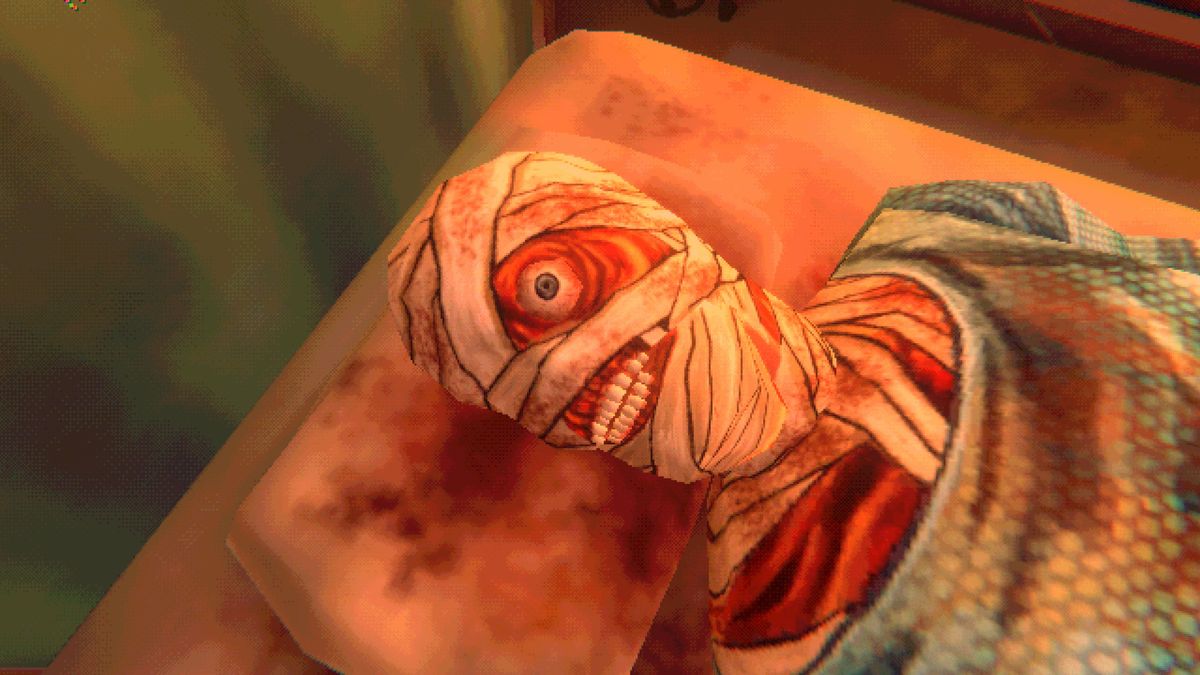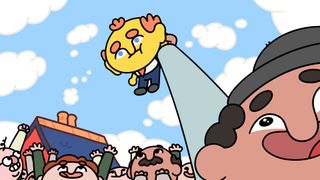
Review catch-up

There were a few games last year that we didn’t have time to review, so before 2025 gets too crazy we’re playing review catch-up and rectifying some of these omissions. So if you’re reading this and wondering if you’ve slipped through a wormhole back into 2024, don’t worry, you’ve not become unfastened from time. We’re just running late.
I played Mouthwashing entirely in one sitting back in October and had to lie down for a while afterward to recover. I felt vile, unsettled at what I’d seen over the previous three hours. Mouthwashing is about as classic a “walking simulator” as you can get mechanically, and while its stabs at more intensive gameplay fell a little flat for me, its narrative, vision, and atmosphere made it one of 2024’s standouts, a people’s champion of indie horror for very good reason.
Mouthwashing is one of those games where, if you’re recommending it to a friend, you go all, “No dude, don’t look up anything about it, just play it, trust me, promise you’ll play it? If Steam says you’re playing Path of Exile instead I’ll egg your house.” That makes it hard to review without spoiling, but I’ll leave the full plot recap and analysis to one of those three-hour YouTube video essays and try to drill into what makes Mouthwashing special, spoiler-free.
The game begins with you playing as Captain Curly of the long haul delivery space ship Tulpar, purposefully setting the vessel on a collision course with an asteroid. After crash landing, the ship is compromised and flooded with emergency foam, sealing it against the vacuum of space. Curly is horrifically maimed and burned in the crash, leaving him unable to speak but still painfully aware of everything around him. The defining image of Mouthwashing is Curly’s broken body laid out in the Tulpar’s med bay, the ship’s time of day/mood lighting screens glitched into an eternal sunset.
Need to know
What is it? An utterly gruesome narrative horror game about the worst workplace in history.
Release date September 26, 2024
Expect to pay $13/£11
Developer Wrong Organ
Publisher Critical Reflex
Reviewed on: Core i5 12600K, RTX 3070, 32 GB RAM
Steam Deck Verified
Multiplayer? No
Link Official Website
Mouthwashing tells a nonlinear story, swapping between Curly’s perspective before the crash and first mate/acting captain Jimmy’s after. The Tulpar is an incredible little videogame environment, a pound-for-pound phenom compared to games with exponentially higher budgets. It’s strangely homey before the crash, despite the omnipresent motivational/disciplining posters from Amazon-esque employer Pony Express. The Tulpar’s full of great clutter and character details to make it feel lived-in by the crew, and swapping between its pre and post-crash state helps underline how drastically things are degrading in the present day. One of my favorite things might be how it has no windows, the aforementioned time of day screens failing to alleviate the close, stuffy feeling of the place—it’s like a submarine, and after the disaster, the crew has no way of knowing how bad things look outside.
The claustrophobic horror with the specter of a cruel, uncaring corporation looming in the background reminded me of Alien, but there’s nothing supernatural or mysterious about the horror in Mouthwashing, just the brutal fallout of a human drama downstream from—sorry to be that guy—capitalism. Somebody should really sort that whole deal out. The aforementioned posters featuring Pony Express mascot Polle had me worried Mouthwashing’s workplace angst might wind up being something blunt and played out at first. There are plenty of latter-day Vault Boys out there yucking it up over the black comedy contrast between their cartoony nature and the evil of their creators. But Mouthwashing is way smarter than that.
The ugliness and inhumanity in the later stages of the story were always there, simmering and fermenting.
It’s a story about how a life without a future makes someone sour, the small joys and overwhelming horror to be found in shit work, and how even the worst circumstances don’t necessarily make one’s actions sympathetic or justified. The crew members of the Tulpar all came into their lot in different ways: A failed student, a rich kid pushed out of the nest, and a high achiever wondering if his success actually fulfilled him, to name a few. They’ve all been curdled by the lives they were funneled into, with the banal cruelty of their employer implied to be itself driven by the continued automation of their industry—unmanned ships don’t go crazy and crash themselves into asteroids, after all.
When things go utterly tits up as rescue continues to be a no-show—I guess that’s kind of a spoiler, but come on, this isn’t a happy story—it feels like a scab being ripped off to let loose a firehose of pus. The ugliness and inhumanity in the later stages of the story were always there, simmering and fermenting, the logical conclusion of people forced to live as processes. The fact that the crew of the Tulpar is so lovingly sketched out, their characters believable and recognizable, serves a similar purpose to the sad, stepped-on coziness of the pre-disaster ship: It gives you a frame of reference for the horror.
Point and click
The actual gameplay of Mouthwashing is less consistent than the story. Most of it goes down smooth, and there are a few strokes of genius that continue to impress me. Then there are some stinker moments that really crapped in my soup—and not like, “This game is supposed to make me feel bad,” more like, “This feels like a mistake, or I am frustrated and missing something.”
For the most part, Mouthwashing has very straightforward problem solving: Finding various forms of key (numerical code, isopropyl alcohol, gun) to open various forms of lock (door, REDACTED, REDACTED). Optional hidden ID cards for each crew member make for a nice scavenger hunt throughout the game, and I dig how the mess hall food processor’s recipe system can be monkeyed around with outside its big story beats. The way you have to click around to pry open Curly’s jaw and feed him painkillers is a brilliant mechanic that’s gruesomely echoed in various scenes throughout the game.
Mouthwashing takes a few stabs at more hands-on gameplay where it mostly falters. There are two puzzles right at the end of the game that are, aesthetically and thematically, absolute heaters: Climactic, shocking moments that really socked me in the gut. But my horror and disgust were undermined by them being fiddly, obtuse little exercises that overstayed their welcome—I’m not proud to say I googled to see what the hell I was supposed to be doing.
There’s also one stealth and one (sort of) action sequence. The action bit was actually quite good and tense, but the stealth section, yeesh. Under its layers of uncanny dread, it’s basically a game of red light green light that goes on for way too long. Doubly so if you’re thick as a sack of bricks like me and it takes some trial and error to figure out what’s going on.
But in terms of atmosphere and narrative—the most important parts of a narrative adventure, I gotta figure—Mouthwashing is a home run. Those crazy Swedes at Wrong Organ popped an absolute dinger and are being rightfully rewarded for it. This is a horror game whose narrative and aesthetics are going to be remembered, celebrated, and emulated moving forward, and it feels like Wrong Organ is just getting started. The future of the Tulpar may not be great, but the future of this group of game devs is bright.
